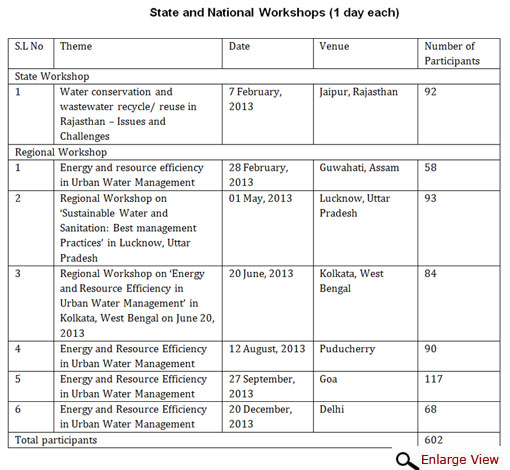Work Overview
The Ministry of Urban Development (MoUD) has designated Centre for Science and Environment (CSE) as a Centre for Comprehensive Capacity Building under the JnNURM directorate for Sustainable Water Management including Water Audit and Efficiency, Sustainable Sanitation including Reuse and Recycle, Water and Energy efficiency. This designation has been for the year 2012 – 2013 to conduct capacity building (training / workshops) and research activities in the sustainable water and wastewater management area.
This distinction is a result of CSE’s past efforts and initiatives on rainwater harvesting, decentralised wastewater management, community based water management, river pollution etc. Besides CSE, MoUD has identified few other reputed institutes from all over India to undertake research and other activities in the areas related to urban development (see JnNURM website).
As the Centre for Comprehensive Capacity Building, the proposed activities to be conducted by CSE included conducting residential training programs (4 day each, 8 no.s ) in the area of sustainable water management including rain water harvesting, decentralized wastewater treatment including reuse/recycle, water efficiency and water sensitive design / planning; workshops - 7 no.s (6 regional and 1 state level); and two research studies (one each documenting case studies / best practices of rain water harvesting in different agro climatic region and decentralized wastewater treatment incl. reuse/recycle at different scales).
Each training programme had a target of 20 participants (total 160 participants in 8 training programmes). In case of overwhelming response (over 40 no.s) for the urban rainwater harvesting training held on 26-29 December 2012, two proposed training programmes have been combined in consultation with the Ministry. Similarly, a training on sustainable water management held on 14-15 May 2013, was combined due to overwhelming response in consultation with the Ministry. The eight training programmes organized have been attended by 167 participants. The trainings were attended by participants from different states across India. For state wise analysis of participation see the following Table
 |
||||||||||||
|
The participation of the trainees has also been presented using the following pie-chart which reflects the extent of national spread of the trainings. |
||||||||||||
 |
||||||||||||
|
The state and regional workshops had a target of 50 and 70 participants respectively (that is total 420-600 participants with seven regional workshops and one state workshop with 50 participants). The seven workshops had 602 registered participants. The regional workshops were organized to cover all states across India. For details of workshop participants refer to the following table and charts. |
||||||||||||
| Details of State / Regional Workshops and its Participants | ||||||||||||
 |
||||||||||||
 |
||||||||||||
 |
||||||||||||
|
The workshop attendees included - state government municipal functionaries’ approx 58 percent of the total participants and other stakeholders approximately 42 percent (includes academicians and researchers, consultants, NGOs, international development agencies, central government and media) who have benefitted and also reflect diverse range of stakeholder engagement. The status of activities / deliverables is given in the following table. |
||||||||||||
|
||||||||||||
Share this article